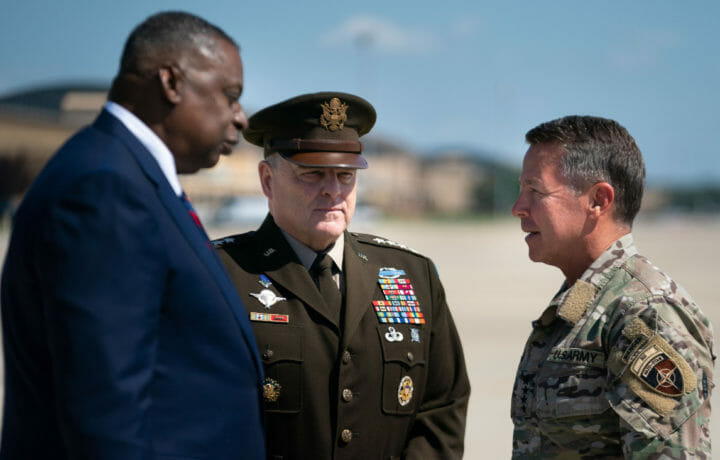Military service is a special calling. Therefore, it takes a strong and disciplined person to serve our nation. When an individual volunteers for military service, they swear to support and defend the Constitution of the United States. By doing so, they willingly agree to conduct themselves in a manner that provides for good order and discipline within the Armed Forces. This personal agreement includes the military justice system, which prohibits military personnel from using “contemptuous speech” against the President and other leaders.
Lt. Col. Scheller Speaks Out Publicly
When one’s conscience can no longer tolerate senior leadership actions or statements, it may be time to move on. Perhaps this is what happened to Marine Corps Lieutenant Colonel Stuart Scheller when he stated on social media this past week, “…people are upset because their senior leaders let them down. And none of them are raising their hands and accepting accountability or saying, ‘We messed this up.’”
Lt. Col. Scheller made these statements out of “growing discontent and contempt for…perceived ineptitude at the foreign policy level” calling out the Secretary of Defense, the Joint Chiefs of Staff, and the Commander of U.S. Central Command. He knew the consequences, stating he was “willing to risk my current battalion commander’s seat, my retirement, my family stability to say some of the things that I want to say.” Lt. Col. Scheller may have found the gate bombing at Hamid Karzai International Airport so objectionable that his conscience would no longer allow him to serve. Five days after his social media commentary went viral, he submitted a formal request for resignation to the Secretary of the Navy, via the Commandant of the Marine Corps
Military Members, Free Speech, and History
In previous court cases involving service members, the Supreme Court has typically deferred to the government’s discretion, allowing the military to restrict personnel in ways most of our citizenry would not accept. In 1962, Supreme Court Chief Justice Earl Warren stated, “It is indisputable that the tradition of our country, from the time of the revolution until now, has supported the military establishment’s broad power to deal with its own personnel. The most obvious reason is that Courts are ill-equipped to determine the impact upon discipline that any particular intrusion upon military authority might have.” A few years later during the Vietnam War, military free speech restrictions were unsuccessfully challenged under the First Amendment in Parker v. Levy (1974) by a court-martially convicted officer, who had criticized the military and argued soldiers should refuse Vietnam service.
Once a serviceman or woman enters the military, the court system provides much less protection of free speech or free conscience than is conferred to civilians. For example, the military’s interest in maintaining a cohesive, homogeneous community outweighs an individual’s right to wear uniform clothing. Similarly, over the next few months testing of Uniform Code of Military Justice (UCMJ) will occur with the new requirement for all service members to take COVID-19 vaccinations.
Military Service is not for everyone
Some never join the military as they fear these types of restrictions. They may find waving goodbye to First Amendment Rights to free speech, free press, and free exercise of religion, intolerable. Swearing to support and defend the Constitution can be a heavy burden and should not be taken lightly.
The military is not for everybody. Military service can be arduous and often requires behavior inconsistent with desire. Should matters of conscience become overwhelming, it is probably time to start looking for another occupation, as freedom of speech is severely restricted. Civilian counterparts may never fully appreciate the challenges associated with military service.




